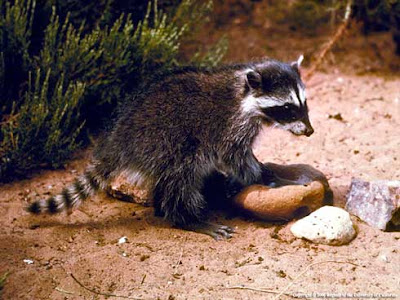
Free workshop -- available via Zoom or in person -- offered by Placer County master gardeners

|
|
A vertebrate pest, such as this young raccoon,
can be a gardener's nemesis. (Photo by L. Fitzhugh,
courtesy UC Integrated Pest Management)
|
Ever wonder what’s eating your plants? How can you tell rat damage from raccoon foraging? And who’s digging all those holes?
Find out during a free workshop hosted by the UC Cooperative Extension Master Gardeners of Placer County.
Set for 10:30 a.m. Saturday, May 14, “Guess Who’s Coming to Dinner – An Integrated Strategy for the Management of Vertebrate Pests” will tackle the pesky problem of identifying hungry and destructive critters.
The one-hour program will be offered via Zoom as well as in person at Loomis Library, 6050 Library Drive, Loomis.
“You will learn various methods to protect your garden from vertebrate pest damage,” say the organizers. “We will review the effectiveness of different methods and teach you how to minimize harm to the environment, other critters and your family. Some of the pests we will cover include squirrels, gophers, moles, voles, rabbits, raccoons and skunks.”
Learn effective ways to outsmart voracious varmints and save your garden – without the use of poisons or harmful chemicals.
No advance registration is necessary, although pre-registration for the Zoom presentation is encouraged. Find full details and Zoom links at: https://pcmg.ucanr.org/?calitem=527828&g=123640 .
Comments
0 comments have been posted.Sacramento Digs Gardening to your inbox.
Food in My Back Yard Series
April 29: What's (already) wrong with my tomato plants?
April 22: Should you stock up on fertilizer? (Yes!)
April 15: Grow culinary herbs in containers
April 8: When to plant summer vegetables
April 1: Don't be fooled by these garden myths
March 25: Fertilizer tips: How to 'feed' your vegetables for healthy growth
March 18: Time to give vegetable seedlings some more space
March 11: Ways to win the fight against weeds
March 4: Potatoes from the garden
Feb. 25: Plant a fruit tree now -- for later
Feb. 18: How to squeeze more food into less space
Feb. 11: When to plant? Consider staggering your transplants
Feb. 4: Starting in seed starting
Sites We Like
Garden Checklist for week of May 4
Enjoy this spring weather – and get gardening!
* Plant, plant, plant! It’s prime planting season in the Sacramento area. Time to set out those tomato transplants along with peppers and eggplants. Pinch off any flowers on new transplants to make them concentrate on establishing roots instead of setting premature fruit.
* Direct-seed melons, cucumbers, summer squash, corn, radishes, pumpkins and annual herbs such as basil.
* Harvest cabbage, lettuce, peas and green onions.
* In the flower garden, direct-seed sunflowers, cosmos, salvia, zinnias, marigolds, celosia and asters. (You also can transplant seedlings for many of the same flowers.)
* Plant dahlia tubers. Other perennials to set out include verbena, coreopsis, coneflower and astilbe.
* Transplant petunias, marigolds and perennial flowers such as astilbe, columbine, coneflowers, coreopsis, dahlias, rudbeckia and verbena.
* Keep an eye out for slugs, snails, earwigs and aphids that want to dine on tender new growth.
* Feed summer bloomers with a balanced fertilizer.
* For continued bloom, cut off spent flowers on roses as well as other flowering plants.
* Add mulch to the garden to maintain moisture. Mulch also cuts down on weeds. But don’t let it mound around the stems or trunks of trees or shrubs. Leave about a 6-inch to 1-foot circle to avoid crown rot or other problems.